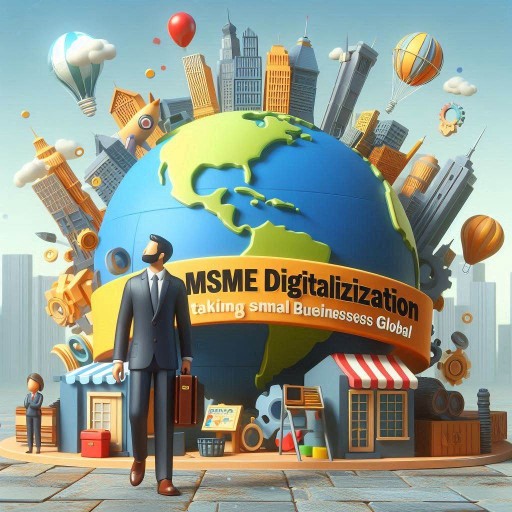TechTrend4u – Digital transformation has created significant opportunities for Micro, Small, and Medium Enterprises (MSMEs) to grow and compete in the global market. MSME digitalization not only enhances operational efficiency but also expands access to a broader customer base. This article will explore how MSME digitalization can elevate global small businesses, highlighting its benefits and providing examples of successful implementations.

What is MSME Digitalization?
MSME digitization is the process of integrating digital technology into various aspects of a small business, from operations to marketing to financial management. Digitalization includes the use of digital tools such as websites, e-commerce platforms, social media, and business apps to improve efficiency, expand market reach, and enhance competitiveness.
Benefits of MSME Digitalization
MSME digitalization offers various benefits, including:
- Access to Global Markets: With digital technology, MSMEs can sell their products and services to customers around the world without having to have physical stores in every location.
- Improved Operational Efficiency: Digital tools help MSMEs manage inventory, payment processes, and deliveries more efficiently, reducing the cost and time required to run a business.
- More Effective Marketing: With digital platforms, MSMEs can reach a wider audience through online advertising, social media, and content marketing, increasing brand visibility and sales.
- Better Decision Making: Digitalization allows MSMEs to collect and analyze customer data, helping them understand market trends and make better business decisions.
- Ease of Collaboration and Networking: Digital platforms allow MSMEs to collaborate with business partners around the world, expanding their network and opening up new business opportunities.
Read more: E-commerce and Digital Marketing: Success in the Online World
Steps for MSME Digitization
To embark on the journey of digitization, MSMEs need to go through several important steps:
Building an Online Presence
The first step in digitization is to build an online presence. This can be done by creating a website or online store that showcases business products and services. An online presence allows MSMEs to be accessed by customers from anywhere and at any time.
Case Example:
Shopee and Tokopedia have become e-commerce platforms that support MSMEs in Indonesia to sell their products online. At a relatively low cost, MSMEs can open an online store on these platforms and start selling their products throughout Indonesia, even to international markets.
Using Social Media for Marketing
Social media is a very effective tool for digital marketing. MSMEs can use platforms such as Facebook, Instagram, and TikTok to promote their products, interact with customers, and build online communities.
Case Example:
Humblezing, a local fashion brand in Indonesia, successfully utilizes Instagram as the main platform to market their products. With an engaging content marketing strategy and collaboration with influencers, Humblezing managed to attract the attention of customers at home and abroad.
Adopt Digital Payment System
Digital payment systems such as e-wallets, online bank transfers, and credit cards facilitate transactions between MSMEs and customers. It also increases customer trust in the business.
Case Example:
In India, MSMEs using Paytm as a payment method saw an increase in sales due to the ease offered to customers in making payments.
Utilize Digital Business Management Tools
MSMEs can utilize digital management tools such as accounting software, inventory management, and CRM (Customer Relationship Management) to improve operational efficiency. These tools help MSMEs better manage finances, stock items, and customer relationships.
Case Example:
Xero and QuickBooks are examples of accounting software widely used by MSMEs to digitally manage their finances, allowing them to focus on business growth.
Collaborate with Global E-commerce Platforms
Joining global e-commerce platforms such as Amazon, eBay, or Alibaba can open up opportunities for MSMEs to sell their products to international markets. This expands market reach and opens up new opportunities.
Case in point:
Many MSMEs in China utilize Alibaba to export their products to the international market. With this platform, they can reach customers around the world without having to have physical infrastructure in each country.
Read more: Digital Transformation: Building the Future of Business
Challenges in MSME Digitalization
While digitization offers many benefits, there are some challenges that MSMEs need to overcome:
Limited Knowledge and Resources
Many MSMEs still lack understanding about digital technology and how to implement it. In addition, limited resources such as capital and manpower are also obstacles in the digitization process.
Data Security and Privacy
In the digital world, data security and customer privacy are very important issues. MSMEs need to ensure that they have a secure system to protect customer data and prevent information leakage.
Intense Competition
The digital market is highly competitive, with thousands of businesses offering similar products. MSMEs must be able to differentiate themselves from competitors by offering unique products and superior customer service.
Read more: Digital Culture: The Key to Successful Digital Transformation
The Future of MSME Digitalization
With the continuous development of technology, the future of MSME digitalization is very promising. Some of the trends that are predicted to affect MSME digitalization in the future include:
Increased Use of AI and Automation
Artificial Intelligence (AI) and automation will be increasingly used to improve the operational efficiency of MSMEs, from data analysis to customer service.
Data-Driven Marketing
MSMEs will increasingly rely on data to make smarter marketing decisions and target more precise audiences, increasing the effectiveness of their campaigns.
Increased Use of E-commerce in Emerging Markets
Emerging markets will continue to be a key growth area for E-commerce, with more MSMEs joining and utilizing digital platforms to reach new customers.
Collaboration and Digital Ecosystems
MSMEs will collaborate more in the digital ecosystem, forming partnerships with technology platforms, logistics service providers, and other industry players to improve their competitiveness.
Read more: Cyber Security in Digital Transformation: Protect Your Business
Conclusion
Digitalization of MSMEs is an important step to bring small businesses to a global level. By utilizing digital technology, MSMEs can improve operational efficiency, reach a wider market, and compete with large enterprises. Although there are challenges to be faced, with the right strategy and adaptation to technological developments, MSMEs can continue to grow and succeed in this digital era.
The future of MSME digitalization is bright, and businesses that are ready to adapt and take advantage of the opportunities offered by digital technology will have a significant competitive advantage in the global market.



